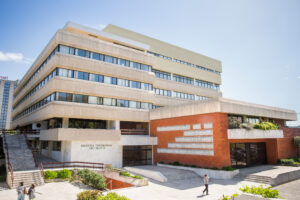Between Democracy and Authoritarian Challenges:
SACRU to host its inaugural Summer School in Lisbon
The Summer School will welcome 16 students from 6 universities in Europe, Oceania, North America and South America, showcasing the global outreach of the SACRU network and its commitment to engaging the young generation worldwide

The Strategic Alliance of Catholic Research Universities (SACRU) will hold its first Summer School: “A New World Order: The Way Ahead between Democracy and Authoritarian Challenges.” The initiative will take place from July 1st to July 14th, 2024, at the Lisbon campus of Universidade Católica Portuguesa, one of the partners of the SACRU network.
The Summer School will welcome 16 students from 6 universities in Europe, Oceania, North America and South America. The program aims to provide a comprehensive educational experience, combining academic study with cultural immersion. This first edition will be dedicated to the pervasive and pressing challenges currently threatening the stability and deemed desirability of ‘liberal democracy’ in an increasingly interconnected, competitive and complex global order.
A crushing sequence of world-rocking events – from the 9/11 terror attacks and wars in Afghanistan and Iraq, to the Russian invasion of Ukraine and the Israeli-Palestinian conflict, a global refugee crisis, unprecedented waves of migration, and a global public health catastrophe caused by Covid-19 – has taken a heavy toll on liberal democracy’s standing, self-confidence and perceived suitability in dealing with present-day intricate realities.
«This Summer School reflects SACRU’s commitment to engaging the young generation worldwide. This program will offer students a unique experience that goes beyond the hours of teaching. It will be an opportunity for them to feel part of a global network and build strong ties with one another. In a present and future defined by internationalization, it is fundamental for the Alliance to keep proposing similar initiatives» SACRU Secretary General and Università Cattolica Vice-Rector Prof. Pier Sandro Cocconcelli commented.
The course will be both extremely relevant and consequential to scholars and students seeking to reflect on how ‘liberal democracy’ should be defined, how it was developed, what interactions have been adopted, what has gone wrong, what criticisms have become popular, and what principles should guide a possible ‘liberal democratic” revival. The multidisciplinary nature of the program is one of its principal strengths. Indeed, the students selected to attend the program come from several backgrounds: Political Science, International Relations, Development and Cooperation, History, Philosophy, Law, Nursing, Languages, Business, and Psychology. This integration of various disciplines enriches the learning experience, fosters a comprehensive understanding of complex global issues, and proves that the SACRU’s focus on interdisciplinarity is a cornerstone of its activities.
In addition to professors from Universidade Católica Portuguesa, faculty members from Università Cattolica del Sacro Cuore (Italy) and Sophia University (Japan) will contribute with their expertise. Participants will also engage in visits and cultural activities around Lisbon, enhancing their overall experience. «Many of the challenges currently threatening the stability of democratic societies are global – both in nature and impact. That is why initiatives like SACRU Summer School bring immense value: it allows experts and students from all over the world to come together and share unique experiences, offer different perspectives and propose innovative solutions, while immersing themselves in a program that promotes scientific curiosity and generous communication. It is a true honor for the University Católica Portuguesa to host this inaugural program in Lisbon and contribute to the revitalization of democratic political thought», Prof. Mónica Dias, Director of the Institute of Political Studies at Universidade Católica Portuguesa and Scientific Director of the Summer School, affirmed.
